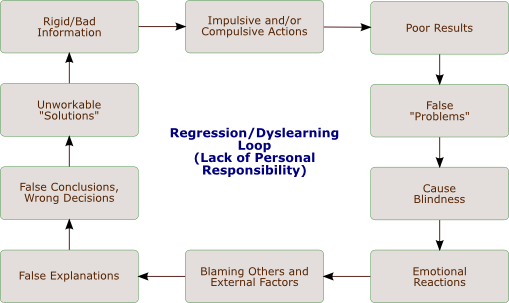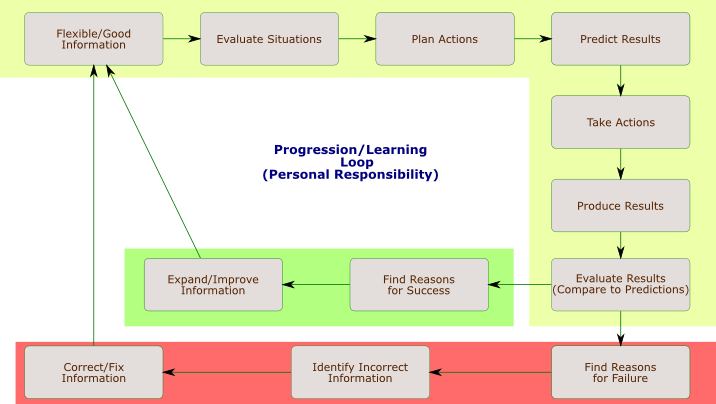Examples of inferior vs. superior brain software!

|
by: Dr. Daniel Amen**
|
| Work Habits of Self-Sabotage | Success |
|
|
| Interactional Self-Sabotage | Success |
|
|
| Individual Self-Sabotage | Success |
|
|
(** Dr. Daniel Amen is author of 'Don't Shoot Yourself in the Foot: A Program to End Self-Defeating Behavior Forever.'
*** To correct "stinking thinking," see #TL10E: THE POWER OF DOING THINGS RIGHT.)
"The deepest human defeat suffered by human beings is constituted by the difference between what one was capable of becoming and what one has in fact become." -- Ashley Montagu
"A failure is a man who has blundered but is not capable of cashing in on the experience." -- Elbert Hubbard
"Mishaps are like knives, that either serve us or cut us, as we grasp them by the blade or the handle." -- James Russell Lowell
98%er Characteristics
For some examples of typical 98%er thinking and behaviour, see:
- J.V. when he was dinging himself (right column).
- CHM (right column).
- PWS (right column).
- RT (right column).
- HH (right column).
Following is an email I received on 8/25/07 (minor edits):
"G.C. here... I have read your emails for quite some time now! I have lost a lot of money trying to make $s so my trust is at zero... I am sure you understand. I have been watching WealthTekk and also received an email explaining that things are moving slower due to the summer. My question is... is your line still moving fast? And is my understanding correct... if you join CrazyFeeder, pay your $99 you will cycle once and in order to cycle again, you must make another $99 purchase? I ask all this as I need to raise the $s in order to have eye surgery before the cateracts completely cover my eyes and can't see at all. Lucky, I got insurance 9 days before I was told I have the problem, but I still have to raise the money needed that the insurance will not cover and I have to pay my portion first at the time I have the appointment for surgery. Sadly, I started selling things and raised $1,000. I used it to get into a gifting program that didn't work... so my money is gone. My job is in jepordary. They have pulled me from the floor and I am helping with the retiring of some 30 years of files and shredding them. We just finished over 20,000 files and it looks as though there might be 2 more months' of work doing that until I can get surgery. But they have said that I must be able to get the surgery as all positions require work on the computer and I have 20/50 corrected vision as of 2 months ago and failing and the doctor states I am not even legal to drive. 2 months is not long enough for me to raise $3,150 needed and yet I am more than scared to spend any money as my paycheck is needed to live and pay present bills. Next problem is I can't sponsor ANYONE! [emphasis added] Seriously, I have tried safelists, buying ads that don't work, buying leads... I am not asking for charity, just an honest way to generate $s. If paying that $99 will honestly get me $160, pocket $61, and I put the $99 back in, then it will only take 60 cycles to get the cash I need and help towards the money I will lose being off work 2 weeks for the surgery and healing. Thanks in advance for your time in responding." -- G.C.
My reply to G.C.: "The growth of my WealthTekk downline has slowed down. With CrazyFeeder, once you've earned your $160, you'll need to buy another $99 position to cycle again. In any case, to cycle quickly and many times in CF, you'll have to sponsor many people -- several hundred. I suggest you learn to sponsor. I'm using your story in "The 98%er Profile and How to Become More Successful." I'll gladly pay you $500 for that. I'll also be happy to request donations from people on my lists. So, provide me with your account details: PayPal, SafePay, e-Bullion, AlertPay, etc. Let me know where you'd like me to pay the $500..." I'm waiting to hear back from G.C.
 To me, G.C.'s most important characteristic is his helplessness, particularly as reflected by "I can't sponsor ANYONE!"
To me, G.C.'s most important characteristic is his helplessness, particularly as reflected by "I can't sponsor ANYONE!"
To me, G.C.'s second-most important characteristic is "reality disconnect." Both his expectations and his attempts to make money online seem to me to have been unrealistic. For more on "unreality," see #TL80A: Creativity Report #1.
To me, G.C.'s third-most important characteristic is "operating below the success threshold."
To me, G.C.'s fourth-most important characteristic is "dyslearning" -- in accordance with the "Regression/Dyslearning Loop." G.C. almost certainly has some bad information in his head. He has taken some desperate actions to make money. His results have been poor. Whatever the real problems may be, he hasn't identified them. He has tended to being blind to the causes of his problems. I don't know to what extent his reactions have been emotional. It's almost a foregone conclusion that he has not taken personal responsibility and has been blaming others and factors outside himself for his poor results. His "I can't sponsor ANYONE!" is a false conclusion. He has made wrong decisions and attempted unworkable "solutions" (probably including wasting $1,000 on the "gifting program"). G.C. most likely doesn't understand enough about money management. Most likely, over time, the information in his head has gotten worse and he has become less capable of making money online.
At the root of G.C.'s eye condition may be "deep imprints." The eye surgery seems vital to handle the symptoms, but won't deal with the causes. Applying "THC" may handle the causes. For 98%ers to become 2%ers, they need to switch from the "Regression/Dyslearning Loop" to the "Progression/Learning Loop." I don't know what portion of 98%ers can read a page like this one and utilize the information to switch from dyslearning to learning. See also:
For 98%ers to become 2%ers, they need to switch from the "Regression/Dyslearning Loop" to the "Progression/Learning Loop." I don't know what portion of 98%ers can read a page like this one and utilize the information to switch from dyslearning to learning. See also:
- #TL03: How to Improve Your Information
- #TL03A: How to Discover and Release Fixed Ideas
- TL03B: Apathy, Psychological Inertia & Success
- #TL03C: How to Wake Up Your Desire to Learn, Grow & Succeed
I suspect that the quickest way for some 98%ers to switch from dyslearning to learning will be achieved by utilizing a competent coach. However, before hiring a coach, you may want to read up on what Steve Salerno has to say about coaching in SHAM: How the Self-Help Movement Made America Helpless.
I also suspect that many 98%ers are in a condition of helplessness to such an extent, that nothing they attempt to become more successful will work, until the address and overcome their helplessness.
Note that to both "Expand/Improve Information" and "Correct/Fix Information" can be added "Improve existing skills" and "Acquire new skills." To "Identify Incorrect Information" can be added "Identify missing/inadequate skills."
Following are some other characteristics typical of 98%ers:
- They tend to repeat the same mistakes and don't learn from them -- CHM (right column) and PWS (right column) are the perfect examples.
- They don't sufficiently appreciate the importance of doing things right and tend to have low competence levels.
- They tend to have a low degree of control.
- They typically don't take enough personal responsibility.
- They tend to take half-hearted actions, easily get discouraged, and then give up because of a low "quit threshold" They don't take massive, determined action.
- They're afraid or reluctant to ask questions.
- They tend to be victims of their emotions.
- They may be able to operate reasonably well in a "job" situation where they're provided with structure, a boss who tells them what to do, and regular paychecks -- where the "success threshold" may be very low. But when it comes to making money online, where they have to provide their own structure and stand on their own feet -- where the "success threshold" is much higher -- they typically fail miserably.
- In accordance with "Peter's Principle," their attempt to make money online may be trying to "promote themselves beyond their level of competence."
- The less competent people are, the more they tend to overestimate their level of competence. 98%ers may overestimate their level of competence dramatically -- see #TL10E: The Power of Doing Things Right.
- The previous item suggests that incompetent people tend to deny their incompetence. I also suspect that 98%ers typically deny their helplessness -- see #TL03E: The Many Forms of Denial.
- Many 98%ers may be reluctant or unwilling to make a realistic assessment of where they really are -- see Discover Where You Are -- preventing them from taking the vital steps to upgrade themselves to above the Success Threshold.
- They tend to use their minds more to harm than help themselves -- self-sabotage.
- They tend to procrastinate.
- 98%ers may wallow in negativity. They may "bite the hand that feeds them," by posting destructive negative messages about programs they hope will pay them. If the authors were capable of design, such posts can be regarded as "designed to achieve the exact opposite of what their authors want!"
- They may suffer from low-level moods that contribute to their helplessness.
- They may suffer from a lack of energy.
- I suspect that fear of rejection is a huge factor related to 98%ers procrastinating, quitting, and being helpless.
Note that in a "job" environment you're typically provided with a job description, so it's pretty easy to determine what you need to do. You typically also have co-workers who can show you how to do things. You also have a boss who tells you what to do. In most "jobs" you don't have to think; just do what you're told. There's also typically a "short distance" between action and result. It's relatively easy to make cognitive connections between actions and results. If you do things wrong, you tend to get quick feedback.
Making money online is a much more challenging environment. There are millions of things you can do... and the vast majority of them won't work for you. There are thousands of "gurus" who tell you what to do... but their advice is unlikely to enable you to become much more successful. Typically, there's a "long distance" between action and result. It's relatively difficult to make cognitive connections between actions and results. (It's similar to drinking a glass of pasteurized milk. Because I haven't researched this sufficiently, let's consider it hypothetical. If there were a connection between pasteurized milk and arthritis, you wouldn't get arthritis immediately after drinking a glass of pasteurized milk. It would take 20-50 years (and many glasses of pasteurized milk). It would be very difficult to make the cognitive connection between pasteurized milk and arthritis.)
Index | Parent Index | Build Freedom: Archive
Disclaimer - Copyright - Contact
Online: buildfreedom.org | terrorcrat.com / terroristbureaucrat.com